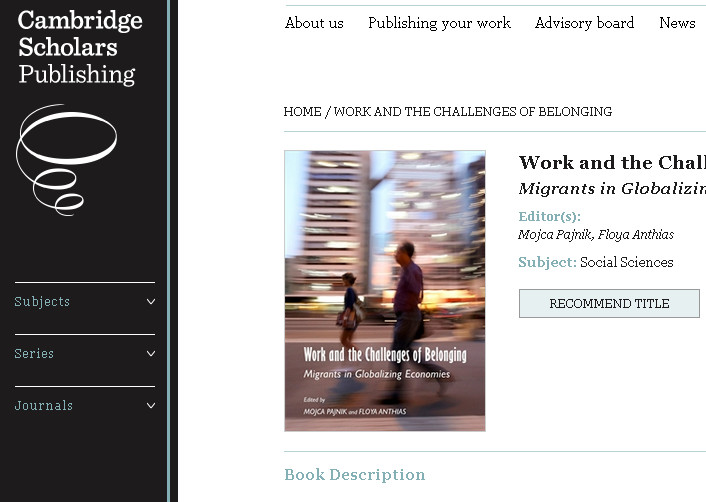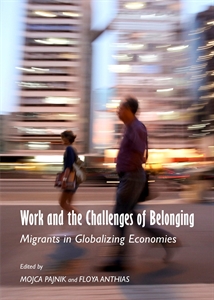Book “Work and the Challenges of Belonging: Migrants in Globalizing Economies”
12. 8. 2014 | Politics

 This book, edited by Mojca Pajnik, senior Peace Institute researcher, and Floya Anthias, professor at the University of East London, engages with migrant work in globalizing economies, both in the EU and worldwide, to explore the relationships between work and the complexity of migrant belonging in transnational spaces. Migrant experiences related to global labour market structures are understood in the context of transnational and national policy frames that largely determine the production of migrant work as poorly paid, precarious, and accompanied by low status and inadequate social protection.
This book, edited by Mojca Pajnik, senior Peace Institute researcher, and Floya Anthias, professor at the University of East London, engages with migrant work in globalizing economies, both in the EU and worldwide, to explore the relationships between work and the complexity of migrant belonging in transnational spaces. Migrant experiences related to global labour market structures are understood in the context of transnational and national policy frames that largely determine the production of migrant work as poorly paid, precarious, and accompanied by low status and inadequate social protection.
Special foci of the book include issues of temporality, circularity and precarity; solidarity and belonging; migrants’ strategies for coping with restrictive migration and economic policies; and practices and patterns relating to the commodification of migrant work. The book also discusses some of the analytical and political problems of migration and labour market discourses and practices, particularly in relation to developments around new forms of exclusion, securitization and ethnicization of migrant work. Apart from analysing migrant precarity, an important focus is migrants’ agency, and their coping strategies and negotiations of belonging in transnational spaces across a range of societies; Argentina, Costa Rica, Chile, Czech Republic Germany, Israel, Italy, Moldova, Norway, Russia, Slovenia, UK are among the countries analysed in this book. Work and the Challenges of Belonging is cross-disciplinary and comparative, engaging with theoretical, empirical and policy approaches.
The book was chosen as a recommended read by the Editorial Advisory Board of Cambridge Scholars Publishers in October 2014. Professor David Weir’s ‘Recommended Read’ says the following about the book:
“Migration and the translocation of skilled and unskilled workers is the iconic process of the global world. The studies in this book range from temporary movements like au pair work, through in-and-back expatriation, to once-in-a-lifetime, permanent relocations into other cultures. The roles of intermediary institutions like social networks and the personal tragedies implied in “not belonging” are described, and the studies illuminate the danger that sources of useful information can mutate into mechanisms (sometimes imprisoning) of social control.”
